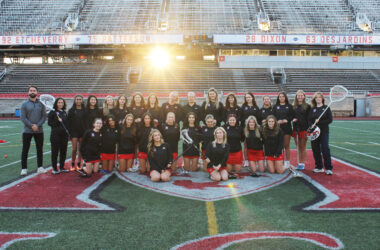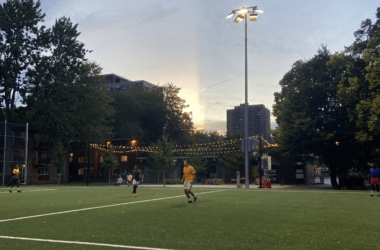 zimbio.com
zimbio.comValérie Grand’Maison, a 23-year-old double major in history and psychology at McGill, won six medals in Beijing in 2008, three of which were gold. But you’ve probably never heard of her.
That’s because Grand’Maison won her medals at the Paralympics. She competes in the S13 category, which, according to the simplified explanation she gave me, is reserved for people in the mildest class of visual impairment (she estimates that she has about ten per cent of her vision). Upon her return to Canada from Beijing, the lack of recognition for a three-time Paralympic champion was hard for her.
“I had such high expectations of what life would be when I came back. I thought I would be a whole different person and people would talk to me differently, but they really didn’t. Nobody knows what the Paralympics are … I thought I would have more recognition but it just didn’t happen, obviously,” she said. “Now I know what I’m doing this for.”
After briefly quitting swimming following the Paralympics, Grand’Maison rediscovered her love for the sport. She credits this, at least in part, to McGill Swimming Head Coach Peter Carpenter.
“I actually quit, and then I heard that Peter was starting as the swim coach at McGill and I thought maybe I would just try as a social thing,” she said. But she enjoyed the training so much that she began to ramp it up again. “I really, really enjoy his program; I really like the guy.”
When asked if it was really the program that lured her back or whether the sport had an addictive hold over her, she laughed. “It’s a little bit of both, I guess,” she said. “I’m addicted to training—really, really addicted to endorphins.”
Now Grand’Maison is juggling two concurrent swimming seasons—CIS and Paralympic—while maintaining a course load that will allow her to graduate next year. The conflicting schedules of the two seasons keep Grand’Maison very busy. For example, over the past weekend she traveled with the team to a CIS swim meet at Dalhousie, one that her teammates and competitors had been training to excel at. For Grand’Maison, the competition was a bump in her training schedule. Her preparation, in the short term, is for a Paralympic meet in two weeks. In the longer run, she’s aiming to peak next fall at the London Paralympics.
“She was sort of going to this meet in a different frame of mind and a little different state of preparedness because she has a swim meet coming up,” Carpenter said. “So she wasn’t tapered the way the others were.”
Even if she isn’t a star in the CIS like she is against Paralympic competition (she holds the world record for the 100m, 200m, 400m, and 800m freestyle and the 400m IM), her experience at the highest levels of the sport sets her apart on the McGill team in some ways.
“As a university swimmer she’s just one of the gang. She’s not the best swimmer on the team but she is definitely the most professional athlete on the team,” said Carpenter.
That professionalism translates into leadership of the type that Carpenter appreciates.
“Huge, massive leadership, absolutely. In many, many different ways. The way I value the most is just her setting an example,” he said. “[She’s] always one of the first people on deck.”
It all stems from her priorities, which are swimming first, school second, and everything else wherever it can fit into her busy schedule, lodged between three courses and 25-30 hours of training per week. If that doesn’t sound like enough, Grand’Maison finds readings and writing assignments take longer due to her visual impairment, which was caused by macular degeneration starting at 12 years old.
Whatever the difficulties, she’s happy to be on the path towards the 2012 Paralympics that she’s taking right now.
“I know that coming back from London I have to sit down and figure out my life,” she said. “[But] my life for the next 10 months is pretty figured out.”








